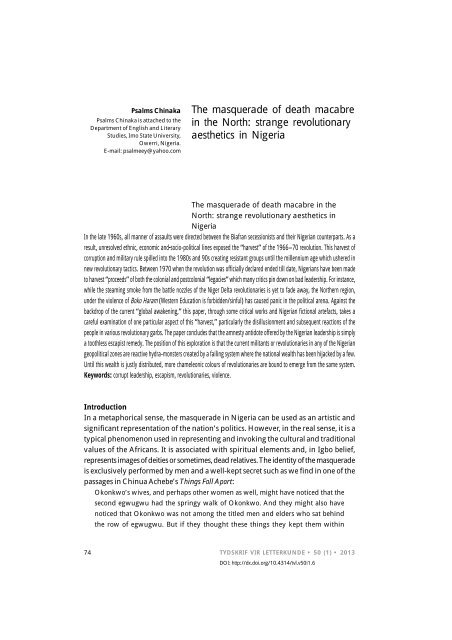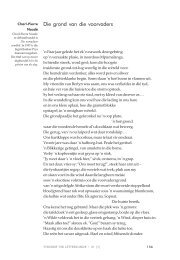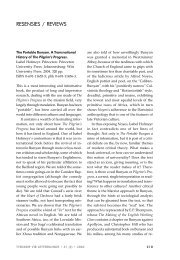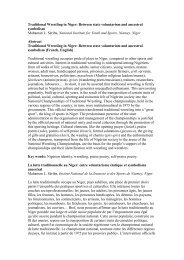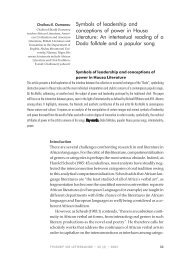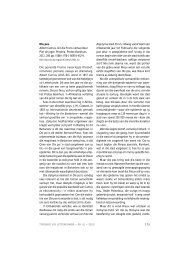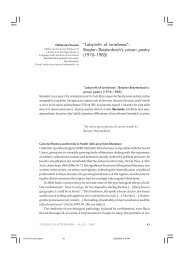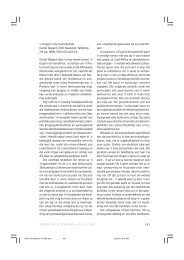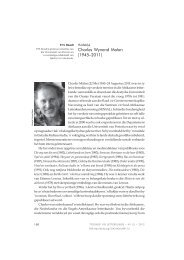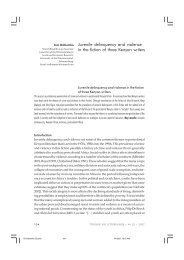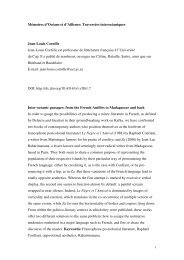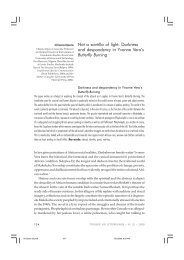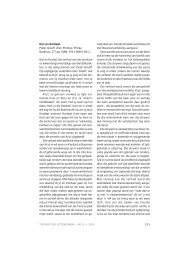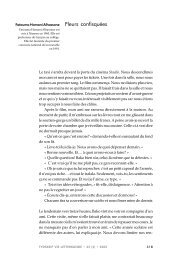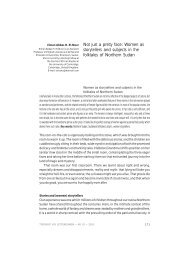The masquerade of death macabre in the North: strange ...
The masquerade of death macabre in the North: strange ...
The masquerade of death macabre in the North: strange ...
- No tags were found...
Create successful ePaper yourself
Turn your PDF publications into a flip-book with our unique Google optimized e-Paper software.
Psalms Ch<strong>in</strong>akaPsalms Ch<strong>in</strong>aka is attached to <strong>the</strong>Department <strong>of</strong> English and LiteraryStudies, Imo State University,Owerri, Nigeria.E-mail: psalmeey@yahoo.com<strong>The</strong> <strong>masquerade</strong> <strong>of</strong> <strong>death</strong> <strong>macabre</strong><strong>in</strong> <strong>the</strong> <strong>North</strong>: <strong>strange</strong> revolutionaryaes<strong>the</strong>tics <strong>in</strong> Nigeria<strong>The</strong> <strong>masquerade</strong> <strong>of</strong> <strong>death</strong> <strong>macabre</strong> <strong>in</strong> <strong>the</strong><strong>North</strong>: <strong>strange</strong> revolutionary aes<strong>the</strong>tics <strong>in</strong>NigeriaIn <strong>the</strong> late 1960s, all manner <strong>of</strong> assaults were directed between <strong>the</strong> Biafran secessionists and <strong>the</strong>ir Nigerian counterparts. As aresult, unresolved ethnic, economic and socio-political l<strong>in</strong>es exposed <strong>the</strong> “harvest” <strong>of</strong> <strong>the</strong> 1966–70 revolution. This harvest <strong>of</strong>corruption and military rule spilled <strong>in</strong>to <strong>the</strong> 1980s and 90s creat<strong>in</strong>g resistant groups until <strong>the</strong> millennium age which ushered <strong>in</strong>new revolutionary tactics. Between 1970 when <strong>the</strong> revolution was <strong>of</strong>ficially declared ended till date, Nigerians have been madeto harvest “proceeds” <strong>of</strong> both <strong>the</strong> colonial and postcolonial “legacies” which many critics p<strong>in</strong> down on bad leadership. For <strong>in</strong>stance,while <strong>the</strong> steam<strong>in</strong>g smoke from <strong>the</strong> battle nozzles <strong>of</strong> <strong>the</strong> Niger Delta revolutionaries is yet to fade away, <strong>the</strong> Nor<strong>the</strong>rn region,under <strong>the</strong> violence <strong>of</strong> Boko Haram (Western Education is forbidden/s<strong>in</strong>ful) has caused panic <strong>in</strong> <strong>the</strong> political arena. Aga<strong>in</strong>st <strong>the</strong>backdrop <strong>of</strong> <strong>the</strong> current “global awaken<strong>in</strong>g,” this paper, through some critical works and Nigerian fictional artefacts, takes acareful exam<strong>in</strong>ation <strong>of</strong> one particular aspect <strong>of</strong> this “harvest,” particularly <strong>the</strong> disillusionment and subsequent reactions <strong>of</strong> <strong>the</strong>people <strong>in</strong> various revolutionary garbs. <strong>The</strong> paper concludes that <strong>the</strong> amnesty antidote <strong>of</strong>fered by <strong>the</strong> Nigerian leadership is simplya toothless escapist remedy. <strong>The</strong> position <strong>of</strong> this exploration is that <strong>the</strong> current militants or revolutionaries <strong>in</strong> any <strong>of</strong> <strong>the</strong> Nigeriangeopolitical zones are reactive hydra-monsters created by a fail<strong>in</strong>g system where <strong>the</strong> national wealth has been hijacked by a few.Until this wealth is justly distributed, more chameleonic colours <strong>of</strong> revolutionaries are bound to emerge from <strong>the</strong> same system.Keywords: corrupt leadership, escapism, revolutionaries, violence.IntroductionIn a metaphorical sense, <strong>the</strong> <strong>masquerade</strong> <strong>in</strong> Nigeria can be used as an artistic andsignificant representation <strong>of</strong> <strong>the</strong> nation’s politics. However, <strong>in</strong> <strong>the</strong> real sense, it is atypical phenomenon used <strong>in</strong> represent<strong>in</strong>g and <strong>in</strong>vok<strong>in</strong>g <strong>the</strong> cultural and traditionalvalues <strong>of</strong> <strong>the</strong> Africans. It is associated with spiritual elements and, <strong>in</strong> Igbo belief,represents images <strong>of</strong> deities or sometimes, dead relatives. <strong>The</strong> identity <strong>of</strong> <strong>the</strong> <strong>masquerade</strong>is exclusively performed by men and a well-kept secret such as we f<strong>in</strong>d <strong>in</strong> one <strong>of</strong> <strong>the</strong>passages <strong>in</strong> Ch<strong>in</strong>ua Achebe’s Th<strong>in</strong>gs Fall Apart:Okonkwo’s wives, and perhaps o<strong>the</strong>r women as well, might have noticed that <strong>the</strong>second egwugwu had <strong>the</strong> spr<strong>in</strong>gy walk <strong>of</strong> Okonkwo. And <strong>the</strong>y might also havenoticed that Okonkwo was not among <strong>the</strong> titled men and elders who sat beh<strong>in</strong>d<strong>the</strong> row <strong>of</strong> egwugwu. But if <strong>the</strong>y thought <strong>the</strong>se th<strong>in</strong>gs <strong>the</strong>y kept <strong>the</strong>m with<strong>in</strong>74TYDSKRIF VIR LETTERKUNDE • 50 (1) • 2013DOI: http://dx.doi.org/10.4314/tvl.v50i1.6
<strong>the</strong>mselves. <strong>The</strong> egwugwu with <strong>the</strong> spr<strong>in</strong>gy walk was one <strong>of</strong> <strong>the</strong> dead ancestors <strong>of</strong><strong>the</strong> clan. He looked terrible with <strong>the</strong> smoked raffia body, a huge wooden facepa<strong>in</strong>ted white except for <strong>the</strong> round hollow eyes and <strong>the</strong> charred teeth that were asbig as a man’s f<strong>in</strong>gers. On his head were two powerful horns. (63–64)<strong>The</strong> thought <strong>of</strong> such practices <strong>of</strong> <strong>the</strong> <strong>masquerade</strong>’s performance, <strong>of</strong>ten provokes anostalgic return to <strong>the</strong> familiar pre-colonial experience through <strong>the</strong>ir lavish costumesand displays, to <strong>the</strong> thrill<strong>in</strong>g experience <strong>of</strong> <strong>the</strong> laugh<strong>in</strong>g or frightened audience. Itrem<strong>in</strong>ds us <strong>of</strong> <strong>the</strong> old and lost African traditional values. <strong>The</strong> re<strong>in</strong>vention <strong>of</strong> <strong>the</strong> be<strong>in</strong>g<strong>of</strong> <strong>the</strong> <strong>masquerade</strong>r and preservation <strong>of</strong> <strong>the</strong> secrecy and sacredness <strong>of</strong> cult knowledge<strong>in</strong> this respect, enable it to function <strong>in</strong> political and social spheres as an agent <strong>of</strong>conflict resolution and peace build<strong>in</strong>g, to police <strong>the</strong> land and to create solidarity <strong>in</strong><strong>the</strong> community. However, <strong>in</strong> this discourse one is bound to notice <strong>the</strong> differencebetween <strong>the</strong> political face <strong>of</strong> <strong>the</strong> mask through its conscious and calculated actionsand <strong>the</strong> pr<strong>of</strong>essed revolutionary face beh<strong>in</strong>d <strong>the</strong> mask. As <strong>the</strong> hidden personalitybeh<strong>in</strong>d <strong>the</strong> o<strong>the</strong>r carries out its selfish actions through <strong>the</strong> guise <strong>of</strong> its seem<strong>in</strong>grevolutionary mission, <strong>the</strong> public is found <strong>in</strong> a wide pool <strong>of</strong> confusion and diverseop<strong>in</strong>ions as whe<strong>the</strong>r to believe <strong>in</strong> this mission or doubt <strong>the</strong> motive beh<strong>in</strong>d its dance.Consequent upon this vacillation, <strong>the</strong> people’s trust is fur<strong>the</strong>r threatened as <strong>the</strong>reexist suspicious moments <strong>of</strong> untrustworth<strong>in</strong>ess and <strong>in</strong>dictment aga<strong>in</strong>st those sameguides who are supposed to prevent <strong>the</strong> <strong>masquerade</strong> from cutt<strong>in</strong>g loose. This politicalscenario reveals three persons <strong>in</strong> one; <strong>the</strong> re<strong>in</strong>’s handlers or guides, <strong>the</strong> phenomenonbeh<strong>in</strong>d <strong>the</strong> mask and <strong>the</strong> <strong>masquerade</strong>. <strong>The</strong> role <strong>of</strong> literature <strong>in</strong> this discourse is <strong>the</strong>refore<strong>of</strong> great significance as it helps us with great <strong>in</strong>sights <strong>in</strong>to our socio-political conditionsand gives us <strong>the</strong> opportunity to show concern for such convolutions that beset oursociety.Memoirs <strong>of</strong> <strong>the</strong> first Nigerian <strong>masquerade</strong>s<strong>The</strong>re is an Igbo say<strong>in</strong>g that a man who cannot tell where <strong>the</strong> ra<strong>in</strong> began to beat himcannot know where he dried his body. For Achebe, <strong>the</strong> writer can actually tell <strong>the</strong>people where <strong>the</strong> ra<strong>in</strong> began to beat <strong>the</strong>m (“<strong>The</strong> Role” 8). Buried <strong>in</strong> Nigeria’s historyand, <strong>of</strong> course, constantly excavated by writers <strong>in</strong> <strong>the</strong>ir fictionalized arts, is <strong>the</strong> factthat <strong>the</strong> beg<strong>in</strong>n<strong>in</strong>g <strong>of</strong> <strong>the</strong> ra<strong>in</strong> (blood-sta<strong>in</strong>ed) beat<strong>in</strong>g Nigerians today as viewed byCh<strong>in</strong>yere Nwahunanya <strong>in</strong>cludes:<strong>the</strong> amalgamation <strong>of</strong> <strong>the</strong> <strong>North</strong> and <strong>the</strong> South <strong>in</strong> 1914; <strong>the</strong> constitutionallyentrenched imbalance <strong>in</strong> representation at <strong>the</strong> federal level; <strong>the</strong> endemic ethnicdistrust, envy and suspicion; <strong>the</strong> ethnic orientation <strong>of</strong> <strong>the</strong> political parties thatemerged before and after <strong>in</strong>dependence; <strong>the</strong> 1962 and 1963 censuses; <strong>the</strong> May andOctober 1966 pogrom; <strong>the</strong> January 1966 coup and July 1966 counter-coup; <strong>the</strong>TYDSKRIF VIR LETTERKUNDE • 50 (1) • 2013 75
creation <strong>of</strong> states on 27 May 1967, and <strong>the</strong> declaration <strong>of</strong> <strong>the</strong> Republic <strong>of</strong> Biafra onMay 30, 1967. (“Biafran” 79)<strong>The</strong> sound <strong>of</strong> Nigeria’s first deadly ra<strong>in</strong>drops <strong>in</strong> <strong>the</strong> early 1960s later grew <strong>in</strong>to arhythm <strong>of</strong> <strong>death</strong> <strong>macabre</strong> for <strong>the</strong> first sets <strong>of</strong> <strong>masquerade</strong>s that danced for nearly threeyears. Preced<strong>in</strong>g <strong>the</strong> ra<strong>in</strong> which later became <strong>the</strong> bloodiest <strong>in</strong> Nigeria’s history weresigns <strong>of</strong> <strong>the</strong> impend<strong>in</strong>g holocaust and genocide <strong>in</strong> <strong>the</strong> form <strong>of</strong> thunder as was earlierprohesied <strong>in</strong> Christopher Okigbo’s Labyr<strong>in</strong>ths <strong>of</strong> “<strong>the</strong> smell <strong>of</strong> blood” actually float<strong>in</strong>g“<strong>in</strong> <strong>the</strong> lavender-mist <strong>of</strong> <strong>the</strong> afternoon […] <strong>the</strong> <strong>death</strong> sentence”(63). After nearly threebloody years, writers immediately expressed <strong>the</strong>ir different versions <strong>of</strong> what <strong>the</strong>yfictively imag<strong>in</strong>ed ei<strong>the</strong>r happened or actually happened. Indeed, <strong>the</strong> memoirs <strong>of</strong> <strong>the</strong>civil war came <strong>in</strong> different shapes; a fact which prompted Nwahunanya to fur<strong>the</strong>rstate that <strong>the</strong>y are ei<strong>the</strong>r triumphant, exculpatory or condemnatory (Harvest xix). <strong>The</strong>long list <strong>in</strong>cludes <strong>The</strong> Combat (Kole Omotoso), <strong>The</strong> Last Duty (Isidore Okpewho), Toads<strong>of</strong> War (Eddie Iroh), Divided We Stand (Cyprian Ekwensi), Heroes (Festus Iyayi) and ahost <strong>of</strong> o<strong>the</strong>rs. As each writer gives his or her own purview <strong>of</strong> <strong>the</strong> war, Omotoso’s <strong>The</strong>Combat did not see any rationale for <strong>the</strong> war as it only served to expose <strong>the</strong> untoldsuffer<strong>in</strong>g. For him, <strong>the</strong> war was a miscarriage <strong>of</strong> judgment by <strong>the</strong> secessionists.Okpewho <strong>in</strong> <strong>The</strong> Last Duty portrays <strong>the</strong> war as a futility, argu<strong>in</strong>g that <strong>the</strong> massivedestruction <strong>of</strong> human lives is not heroic. For him <strong>the</strong> adverse human and emotionaldimensions <strong>of</strong> war are more paramount. He sees <strong>the</strong> war as an agent that destroys <strong>the</strong>personal and communal sacredness <strong>of</strong> people. War leads to <strong>the</strong> wanton kill<strong>in</strong>gs <strong>of</strong>human be<strong>in</strong>gs, <strong>the</strong> violation <strong>of</strong> natural laws and traditional beliefs. War also, forOkpewho, is conduct that gives birth to such societal vices as prostitution and powerdrunkenness among o<strong>the</strong>rs. To enunciate his position he <strong>the</strong>atrically portrays Toje asbecom<strong>in</strong>g power-drunk just as Aku, a house wife, becomes unfaithful to her absenthusband. Such pictures help to justify J. P. Clark’s statement <strong>in</strong> one <strong>of</strong> his poems <strong>in</strong>which he states: “we are all casualties” (28).Edie Iroh <strong>in</strong> Toads <strong>of</strong> War sees <strong>the</strong> ord<strong>in</strong>ary soldiers like Kalu, Ikechi and SergeantMeju as <strong>the</strong> actual heroes <strong>of</strong> <strong>the</strong> war, because <strong>the</strong>y fought seriously and s<strong>in</strong>cerely topreserve <strong>the</strong> rights <strong>of</strong> <strong>the</strong>ir people. Some sacrificed <strong>the</strong>ir lives while o<strong>the</strong>rs got maimed<strong>in</strong> order to save <strong>the</strong> people. He castigates Biafran leaders who <strong>in</strong>dulged <strong>in</strong> pr<strong>of</strong>ligacyand merry-mak<strong>in</strong>g while send<strong>in</strong>g <strong>the</strong> ord<strong>in</strong>ary soldiers to <strong>the</strong> war front to fight anddie. But Cyprian Ekwensi’s Divided We Stand, runs along <strong>the</strong> l<strong>in</strong>e <strong>of</strong> <strong>in</strong>dividuals ra<strong>the</strong>rthan collective heroism. For Ekwensi, Chika <strong>the</strong> correspondent is a completely realized<strong>in</strong>dividual and an <strong>in</strong>tellectual. Chika’s attributes arise from his courage andforthrightness, and, above all, he is a nationalist at heart.From a different approach, Festus Iyayi’s Heroes br<strong>in</strong>gs with it a new revelationthat <strong>the</strong> leaders <strong>of</strong> Biafra and Nigeria are guilty for <strong>the</strong> murder <strong>of</strong> <strong>the</strong> poor masses whowere all driven to a war <strong>the</strong>y, <strong>in</strong> <strong>the</strong> first place, were forced or conscripted <strong>in</strong>to; a war76TYDSKRIF VIR LETTERKUNDE • 50 (1) • 2013
<strong>in</strong> which <strong>the</strong> rich from both sides would exploit <strong>the</strong> <strong>death</strong> <strong>of</strong> each soldier, a war thatrendered <strong>the</strong> poor poorer, <strong>the</strong> rich richer and <strong>the</strong> generals heroes. Ernest Emenyonumakes this view clearer as he states that, “Iyayi shows support nei<strong>the</strong>r for <strong>the</strong> federalarmy nor for <strong>the</strong> Biafran army. His concern is for <strong>the</strong> ‘third army’—<strong>the</strong> unknownsoldiers, who like <strong>the</strong> civilian masses carry burden <strong>of</strong> suffer<strong>in</strong>g but are never recognizedwhen alive and never when <strong>the</strong>y die.” (107)Iyayi’s position is simply that <strong>the</strong>re was no rationale for <strong>the</strong> war except that <strong>the</strong>leaders were merely struggl<strong>in</strong>g for supremacy while us<strong>in</strong>g <strong>the</strong> ord<strong>in</strong>ary people astools <strong>of</strong> war. His desire is to use this <strong>macabre</strong> dance to expose <strong>the</strong> work<strong>in</strong>gs <strong>of</strong> certa<strong>in</strong>forces <strong>in</strong> <strong>the</strong> Nigerian society, forces which he considers as prevalent today as <strong>the</strong>ywere <strong>in</strong> <strong>the</strong> past. Thus, for him, <strong>the</strong>re is need <strong>the</strong>refore for a totally different army toask questions about <strong>the</strong> purpose <strong>of</strong> <strong>the</strong> war, and about <strong>the</strong> reasons beh<strong>in</strong>d <strong>the</strong> war,s<strong>in</strong>ce <strong>the</strong> real enemies are <strong>the</strong> politicians who robbed <strong>the</strong> country bl<strong>in</strong>d (90). Iyayifur<strong>the</strong>r substantiates this position elsewhere <strong>in</strong> <strong>the</strong> novel, thus:Sell your arms to your enemy and collect <strong>the</strong> money […] send <strong>the</strong> troops out <strong>in</strong>to<strong>the</strong> battle before <strong>the</strong>ir pay day and get as many <strong>of</strong> <strong>the</strong>m as possible killed andcollect <strong>the</strong>ir pay […] capture a town and <strong>the</strong> first place you make for are <strong>the</strong> banks.<strong>The</strong> important th<strong>in</strong>g is to get <strong>the</strong> money because this war is part <strong>of</strong> <strong>the</strong> wholebus<strong>in</strong>ess enterprise. And that means it must yield pr<strong>of</strong>its. (148)This message depicts <strong>the</strong> obscure but vantage position <strong>of</strong> <strong>the</strong> leaders who are <strong>in</strong>visible<strong>in</strong> <strong>the</strong> danc<strong>in</strong>g arena <strong>of</strong> <strong>the</strong> <strong>masquerade</strong>s, and <strong>the</strong> <strong>masquerade</strong>s who are <strong>in</strong> turnprogrammed to accomplish certa<strong>in</strong> questionable missions. <strong>The</strong>y are crim<strong>in</strong>ally cha<strong>in</strong>edto <strong>the</strong>ir executioners who are actually <strong>the</strong> <strong>in</strong>struments hidden under <strong>the</strong> mask,pr<strong>of</strong>ess<strong>in</strong>g change under <strong>the</strong> costume <strong>of</strong> some sort <strong>of</strong> revolution on behalf <strong>of</strong> <strong>the</strong> tribe,religion or people. Of course, <strong>the</strong>y will always be at <strong>the</strong> receiv<strong>in</strong>g end, <strong>the</strong> docilemasses that are always presented with <strong>the</strong> <strong>masquerade</strong>’s seem<strong>in</strong>g mission. <strong>The</strong>refore,<strong>the</strong> general concern <strong>of</strong> <strong>the</strong> people is bracketed with<strong>in</strong> <strong>the</strong> colossal destruction <strong>the</strong> warengendered <strong>in</strong> terms <strong>of</strong> loss <strong>of</strong> lives and property, and <strong>the</strong> concomitant suffer<strong>in</strong>g andbrutalisation <strong>of</strong> those who ei<strong>the</strong>r fell victim to <strong>the</strong> onslaught <strong>of</strong> <strong>death</strong>, or experiencedphysical or mental trauma.Contemporary <strong>macabre</strong> dancesIronically, echoes and consequences <strong>of</strong> <strong>the</strong> frighten<strong>in</strong>g proportion <strong>of</strong> violence thatwere recorded <strong>in</strong> <strong>the</strong> past are today resound<strong>in</strong>g repeatedly <strong>in</strong> <strong>the</strong> different geopoliticalzones and under <strong>the</strong> same old recognisable posture <strong>of</strong> various ethnic or religious<strong>masquerade</strong>s. Whips now turned aga<strong>in</strong> <strong>in</strong>to blood-dripp<strong>in</strong>g cutlasses have becomeweapons <strong>in</strong> <strong>the</strong> hands <strong>of</strong> <strong>the</strong> so-called “revolutionary <strong>masquerade</strong>s” who claim topolice <strong>the</strong> same society <strong>the</strong>y actually destroy. <strong>The</strong> not-too-far-fetched examples <strong>of</strong>TYDSKRIF VIR LETTERKUNDE • 50 (1) • 2013 77
wounds <strong>in</strong>flicted by <strong>the</strong> MEND (Movement for <strong>the</strong> Emancipation <strong>of</strong> Niger Delta)and, most recently, Boko Haram are daily refreshed <strong>in</strong> <strong>the</strong> m<strong>in</strong>ds <strong>of</strong> Nigerians throughdaily explosions <strong>of</strong> pipel<strong>in</strong>es or Nigerians <strong>the</strong>mselves. Re-evict<strong>in</strong>g echoes <strong>of</strong> <strong>the</strong> 1967–70 <strong>death</strong> <strong>macabre</strong> through <strong>the</strong> image <strong>of</strong> <strong>the</strong> <strong>masquerade</strong> as a carrier <strong>of</strong> <strong>death</strong>, we aredist<strong>in</strong>ctly hear<strong>in</strong>g aga<strong>in</strong> what <strong>The</strong>odora Ezeigbo describes as <strong>the</strong> “chaotic rhythm <strong>of</strong><strong>the</strong> tragic war and <strong>the</strong> violence <strong>of</strong> m<strong>in</strong>dless soldiers merged with <strong>the</strong> madden<strong>in</strong>gsounds <strong>of</strong> drumm<strong>in</strong>g attended by grotesquely masked Egwugwu. It is <strong>in</strong>deed a bizarreconsortium. <strong>The</strong> reader is constantly confronted with <strong>the</strong> confusion created by <strong>the</strong>merg<strong>in</strong>g <strong>of</strong> <strong>the</strong>se discordant rhythms and forces.” (161)<strong>The</strong> puppetry <strong>of</strong> <strong>the</strong> present nor<strong>the</strong>rn <strong>masquerade</strong> <strong>in</strong> Nigeria recalls <strong>the</strong> fate <strong>of</strong> <strong>the</strong>Igbo and o<strong>the</strong>r sou<strong>the</strong>rn Nigerians who are repeatedly <strong>the</strong> victims and scapegoatsused <strong>in</strong> <strong>the</strong> ritual <strong>of</strong> cleans<strong>in</strong>g one particular tribe. <strong>The</strong> situation has been disturb<strong>in</strong>glyportrayed <strong>in</strong> Wole Soy<strong>in</strong>ka’s play, <strong>The</strong> Strong Breed, where Eman, a non-<strong>in</strong>digene, ispicked as a carrier who would take away <strong>the</strong> ills <strong>of</strong> <strong>the</strong> community and die for <strong>the</strong>m.Ikemefuna’s similar role <strong>in</strong> Achebe’s Th<strong>in</strong>gs Fall Apart fur<strong>the</strong>r re-evicts this phenomenon<strong>of</strong> search<strong>in</strong>g for <strong>the</strong> sacrificial lamb from <strong>the</strong> tribe <strong>of</strong> <strong>the</strong> strong breed. This k<strong>in</strong>d <strong>of</strong>l<strong>in</strong>ger<strong>in</strong>g problem would likely provoke a battery <strong>of</strong> questions such as, whose tribe,how justifiable and for how long will <strong>the</strong>se sacrifices be susta<strong>in</strong>ed? If <strong>the</strong>refore, <strong>the</strong>reis a constant supply <strong>of</strong> sacrificial lambs from a particular part <strong>of</strong> <strong>the</strong> sovereignty,which has severally and consequently led to reprisal attacks <strong>in</strong> <strong>the</strong> past, lead<strong>in</strong>g tomore human sacrifices, this condition will mean that peace <strong>in</strong> a country like Nigeriawill not come through <strong>the</strong> suppression <strong>of</strong> desires for autonomy, o<strong>the</strong>rwise <strong>the</strong> socalledcurrent democracy would be a fraud. For it will <strong>the</strong>n be a violation <strong>of</strong> ethnicrights not to tolerate an open discussion <strong>of</strong> issues on nationhood, even when <strong>the</strong>reare already on-go<strong>in</strong>g discourses that seek to deepen <strong>the</strong> divide between ethnicitiesthat constitute <strong>the</strong> postcolonial Nigeria.Apart from <strong>the</strong> Igbo example which gave birth to <strong>the</strong> Biafran <strong>masquerade</strong>, <strong>the</strong> NigerDelta crisis has divulged its own <strong>masquerade</strong> with a <strong>strange</strong> tactical <strong>macabre</strong> dance <strong>of</strong>target<strong>in</strong>g oil wells and foreign/<strong>in</strong>digenous workers. This is a familiar story <strong>of</strong> a peoplewhose environment and landscape have been neglected and destroyed by both <strong>the</strong>government and <strong>the</strong> expatriates. As have been earlier noted elsewhere, “<strong>The</strong> vitiation <strong>of</strong><strong>the</strong> flora and fauna <strong>of</strong> <strong>the</strong> region, <strong>the</strong> decimation <strong>of</strong> <strong>the</strong> human population, and <strong>the</strong>frustration <strong>of</strong> <strong>the</strong> economic well-be<strong>in</strong>g <strong>of</strong> <strong>the</strong> people, have been noted by many critics asissues that are <strong>in</strong>evitable <strong>in</strong> <strong>the</strong> exploration <strong>of</strong> <strong>the</strong> literature <strong>of</strong> <strong>the</strong> region.” (Ch<strong>in</strong>aka 558)<strong>The</strong> Niger Delta environmental exploitation is sometimes confused with oilexploration. <strong>The</strong> exploitation comes under <strong>the</strong> umbrella <strong>of</strong> <strong>the</strong> typical Nigerianpolitical promises <strong>of</strong> <strong>in</strong>frastructural development which <strong>in</strong>clude schools, hospitals,roads, markets, etc. But ironically, <strong>the</strong> reality on <strong>the</strong> ground is that one f<strong>in</strong>ds <strong>the</strong> exactopposite. This is <strong>the</strong> picture Inno Ejike’s novel Oil at my Backyard presents dur<strong>in</strong>g <strong>the</strong>Oghu festival. Thus,78TYDSKRIF VIR LETTERKUNDE • 50 (1) • 2013
As <strong>the</strong> Oghu <strong>masquerade</strong> was patroll<strong>in</strong>g <strong>the</strong> village <strong>in</strong> company <strong>of</strong> some youths,<strong>the</strong>y spotted <strong>the</strong> brand new Toyota […] some <strong>of</strong> <strong>the</strong>m had <strong>the</strong> feel<strong>in</strong>g that <strong>in</strong> nodistant time, <strong>the</strong>y may be asked to vacate <strong>the</strong>ir ancestral homes for <strong>the</strong> oil men […]<strong>the</strong> oil companies are like cockroaches, <strong>the</strong>y check <strong>in</strong> but <strong>the</strong>y do not check out. <strong>The</strong>most annoy<strong>in</strong>g aspect <strong>of</strong> <strong>the</strong>ir bus<strong>in</strong>ess is, <strong>the</strong> government took all <strong>the</strong> proceedsfrom oil and only left beh<strong>in</strong>d devastation <strong>of</strong> <strong>the</strong>ir farmland, and eventually asked<strong>the</strong>m to vacate to a very poor land, without adequate compensation. When <strong>the</strong>villagers try to resist ejection order from <strong>the</strong>ir farmland, <strong>the</strong> government called <strong>in</strong><strong>the</strong> police and <strong>the</strong> military to guard <strong>the</strong> entire area. (9–10)<strong>The</strong>re is need to underscore <strong>the</strong> significant juxtaposition <strong>of</strong> <strong>the</strong> resist<strong>in</strong>g strength <strong>of</strong><strong>the</strong> village located <strong>in</strong> <strong>the</strong> personality <strong>of</strong> <strong>the</strong> <strong>masquerade</strong> and <strong>the</strong> youths as to ward <strong>of</strong>f<strong>the</strong> <strong>in</strong>trud<strong>in</strong>g exploiters on <strong>the</strong> one hand, and those that have sent <strong>the</strong>m (<strong>the</strong>government) on <strong>the</strong> o<strong>the</strong>r hand. For <strong>the</strong>se two socio-political forces will always take<strong>the</strong> stage <strong>in</strong> a violent manner <strong>in</strong> almost all such cases. As can be anticipated later <strong>in</strong> <strong>the</strong>novel, when eventually <strong>the</strong>re is protest by <strong>the</strong> community aga<strong>in</strong>st sheer exploitationand <strong>in</strong>justices, <strong>the</strong> government is <strong>in</strong>dicted for “f<strong>in</strong>e-tun<strong>in</strong>g her decrees, on how todeal with dissident oil produc<strong>in</strong>g areas, <strong>in</strong>stead <strong>of</strong> provid<strong>in</strong>g necessary facilities toalleviate <strong>the</strong>ir suffer<strong>in</strong>g” (134). One could almost hear <strong>the</strong> author reason<strong>in</strong>g through<strong>the</strong> petroleum chairman <strong>of</strong> a last<strong>in</strong>g and better solution, thus: “If you can arrange fora barrack, why not arrange for a general hospital or an electricity project to be sited<strong>the</strong>re […] <strong>The</strong> people would be more peaceful with basic amenities than with lawenforcement Agencies, who will be harass<strong>in</strong>g <strong>the</strong>m from time to time. It would bemore expensive to ma<strong>in</strong>ta<strong>in</strong> <strong>the</strong> troops <strong>in</strong> <strong>the</strong> long run.” (139)For <strong>the</strong> uncompromised youths or “<strong>masquerade</strong>s,” Tanure Ojaide refers to <strong>the</strong>m as<strong>the</strong> “Egbesu Boys.” He believes that <strong>the</strong>y “do <strong>the</strong> honorable duty <strong>of</strong> brave sons”(Ojaide 41). Little or no criticism may have <strong>in</strong>itially trailed after <strong>the</strong>m until <strong>the</strong> po<strong>in</strong>twhere a clear picture <strong>of</strong> <strong>the</strong>ir frenzy drive for selfish material ga<strong>in</strong>s appeared as <strong>the</strong>primary motive beh<strong>in</strong>d <strong>the</strong>ir revolutionary <strong>death</strong> <strong>the</strong>atre. At that po<strong>in</strong>t, <strong>the</strong>y becomesuspicious <strong>masquerade</strong>s who have played <strong>in</strong>to <strong>the</strong> hands <strong>of</strong> corrupt political guides,<strong>the</strong>refore compromis<strong>in</strong>g a genu<strong>in</strong>e cause. Amongst <strong>the</strong>ir recorded he<strong>in</strong>ous crimes<strong>in</strong>clude, “bunker<strong>in</strong>g, robbery, assass<strong>in</strong>ations, kidnapp<strong>in</strong>gs, bank heist, etc.” (Ch<strong>in</strong>aka29).Ironically, at <strong>the</strong> seem<strong>in</strong>g end <strong>of</strong> <strong>the</strong> Niger Delta <strong>macabre</strong> <strong>in</strong> 2009, <strong>the</strong> FederalGovernment fur<strong>the</strong>r compensated or enriched members with billions <strong>of</strong> naira for<strong>the</strong>m to desist from murder cases and more importantly, for <strong>the</strong>m to stop blow<strong>in</strong>g up<strong>the</strong>ir “oil wells”. <strong>The</strong> <strong>death</strong> drama seem<strong>in</strong>gly ended with <strong>the</strong> Government’s antidotesbranded “amnesty” or “legal freedom from all he<strong>in</strong>ous crimes previously committed”<strong>in</strong> addition to <strong>the</strong> “settlement” <strong>of</strong> billions <strong>of</strong> naira under <strong>the</strong> umbrella <strong>of</strong> “characterrehabilitation”.TYDSKRIF VIR LETTERKUNDE • 50 (1) • 2013 79
Most currently, ano<strong>the</strong>r <strong>masquerade</strong> <strong>in</strong> <strong>the</strong> nor<strong>the</strong>rn part has emerged, giv<strong>in</strong>g itsown excuse why it has become necessary, this time, to target police stations, churchesand <strong>the</strong> general Nigerian people. <strong>The</strong> latest bomb<strong>in</strong>g spree and o<strong>the</strong>r forms <strong>of</strong> crisis,tak<strong>in</strong>g its cue from <strong>the</strong> Niger Delta <strong>in</strong>cidents haves been panoramically reflected <strong>in</strong>each <strong>of</strong> <strong>the</strong> latest seventeen short stories by Sumaila Umaisha. Each <strong>of</strong> <strong>the</strong> storieswhich come <strong>in</strong> <strong>the</strong> form <strong>of</strong> Nigeria’s template <strong>of</strong> pa<strong>in</strong>s is <strong>in</strong>dependently topical, butcollectively <strong>in</strong>terconnected with a <strong>the</strong>matic centrality that reveals an endangeredsociety characterized by political violence, militancy, <strong>in</strong>sanity, etc. <strong>The</strong>se segmentednarratives replicate <strong>the</strong> admixture <strong>of</strong> unnerv<strong>in</strong>g realistic moments <strong>of</strong> an over populatedmulti-tribal society simply underscored by <strong>the</strong> s<strong>in</strong>gle word which also is <strong>the</strong> title <strong>of</strong><strong>the</strong> collection—Hoodlums. <strong>The</strong>re is a silent <strong>in</strong>dictment by <strong>the</strong> author aga<strong>in</strong>st almostevery s<strong>in</strong>gle member <strong>of</strong> <strong>the</strong> approximately one hundred and fifty million citizensshar<strong>in</strong>g one common national identity as hoodlums. <strong>The</strong>re is reference to <strong>the</strong> religious,political and ethnic riots, <strong>the</strong> societal and cultural stigmatization, <strong>the</strong> <strong>in</strong>sanity <strong>of</strong>every man, and <strong>the</strong> mysticism <strong>of</strong> <strong>the</strong> universe. For <strong>in</strong>stance, one is bound to read withrevulsion <strong>the</strong> stories <strong>of</strong> <strong>the</strong> “<strong>The</strong> Godfa<strong>the</strong>r” and “Do or Die” where <strong>the</strong>re is acutestruggle for control and dom<strong>in</strong>ance which is <strong>the</strong> violent power game that politiciansplay. <strong>The</strong>re is also <strong>the</strong> issue <strong>of</strong> avoidable grief and pa<strong>in</strong>s as first <strong>in</strong>troduced by <strong>the</strong>story <strong>of</strong> little Tene who loses her <strong>in</strong>nocence by watch<strong>in</strong>g her dearly beloved mo<strong>the</strong>rdie <strong>in</strong> <strong>the</strong> story entitled “Militants.”Umaisha attempts to explore <strong>the</strong> general madness or <strong>in</strong>sanity <strong>of</strong> people irrespective<strong>of</strong> class, education, or gender, as an underly<strong>in</strong>g message that is described as actionsthat are very unreasonable and possibly dangerous. “<strong>The</strong> Riot” tells <strong>the</strong> satirical tale<strong>of</strong> an Alhaji Ibrahim who watches with delight <strong>the</strong> burn<strong>in</strong>g city through a pair <strong>of</strong>b<strong>in</strong>oculars, only to regret <strong>in</strong> <strong>the</strong> end that his wife has fallen victim to <strong>the</strong> crisis. <strong>The</strong>title story “Hoodlums” is a similar retributive warn<strong>in</strong>g to those who actually throwstones <strong>in</strong>to <strong>the</strong> market place. It literally focuses on <strong>the</strong> experience <strong>of</strong> Ben, a sensationalistjournalist whose reports feast on and sometimes <strong>in</strong>flame riots, hav<strong>in</strong>g a penchant forsometimes fil<strong>in</strong>g <strong>in</strong> “reports <strong>in</strong> advance <strong>of</strong> <strong>the</strong> events” (17). This story shares a semblancewith <strong>the</strong> case <strong>of</strong> Alhaji Ibrahim <strong>in</strong> “<strong>The</strong> Riot,” as both men are later forced by <strong>the</strong>author to see what <strong>the</strong>y never saw dur<strong>in</strong>g <strong>the</strong> pleasurable moments <strong>of</strong> <strong>the</strong>ir s<strong>in</strong>s. In<strong>the</strong> case <strong>of</strong> “Hoodlums”, “No one looked back except Ben. And what he saw wasbeyond words. He slumped. ‘To Rigasa!’ <strong>the</strong> Inspector ordered <strong>the</strong> driver.” (30) In <strong>the</strong>case <strong>of</strong> “<strong>The</strong> Riot”, when Alhaji Ibrahim f<strong>in</strong>ally, “peeped <strong>in</strong>to <strong>the</strong> car, he discovered tohis eternal shock <strong>the</strong> real cause <strong>of</strong> <strong>the</strong> grief. On <strong>the</strong> back seat was <strong>the</strong> body <strong>of</strong> his wife.”(102)For a story like “<strong>The</strong> Honourable M<strong>in</strong>ister” which satirizes <strong>the</strong> political hypocrisy<strong>in</strong> Nigeria, one f<strong>in</strong>ds <strong>the</strong> failed but applauded projects and policies embarked uponby those <strong>in</strong> power which bears no correlation with <strong>the</strong> yearn<strong>in</strong>g and plight <strong>of</strong> <strong>the</strong>masses. It is such political excesses that give rise to all <strong>the</strong> manners <strong>of</strong> <strong>masquerade</strong>s <strong>in</strong>80TYDSKRIF VIR LETTERKUNDE • 50 (1) • 2013
this discourse. In <strong>the</strong> mock drama, one gets <strong>the</strong> uneasy feel<strong>in</strong>g from <strong>the</strong> ease withwhich <strong>the</strong> Nigerian leaders (as represented by <strong>the</strong> character <strong>of</strong> <strong>the</strong> M<strong>in</strong>ister) desecrate<strong>the</strong> social contract established with <strong>the</strong> people. Such picture is summed up <strong>in</strong> <strong>the</strong>follow<strong>in</strong>g passage, as it should naturally disturb <strong>the</strong> meditative thought-flow <strong>of</strong> everyNigerian:“Ha-ha-ha!” <strong>the</strong> M<strong>in</strong>ister and his entourage laughed boisterously from <strong>the</strong> stage.“Who says to be a m<strong>in</strong>ister is a small th<strong>in</strong>g,” <strong>the</strong> M<strong>in</strong>ister enthused, trembl<strong>in</strong>g withlaughter. “<strong>The</strong> siren really scared <strong>the</strong> hell out <strong>of</strong> <strong>the</strong>m,” said one <strong>of</strong> <strong>the</strong> members <strong>of</strong><strong>the</strong> entourage. “Why not!” What is a <strong>masquerade</strong> without <strong>the</strong> mask? Without thunderand lightn<strong>in</strong>g, how can <strong>the</strong> mortal appreciate what goes <strong>in</strong>to ra<strong>in</strong> mak<strong>in</strong>g? Ha-haha… ! (88)<strong>The</strong> work generally reveals <strong>the</strong> spectrum <strong>of</strong> crim<strong>in</strong>ality <strong>in</strong> Nigeria that cuts across allfacets <strong>of</strong> life. Violent crimes becom<strong>in</strong>g a brand <strong>in</strong> virtually every aspect <strong>of</strong> <strong>the</strong> life <strong>of</strong><strong>the</strong> people which are <strong>in</strong>cited and perpetuated by <strong>the</strong> hoodlums or <strong>masquerade</strong>shid<strong>in</strong>g under <strong>the</strong> guise <strong>of</strong> “freedom fighters” as portrayed <strong>in</strong> <strong>the</strong> story—”Militants”;violent crimes perpetuated by <strong>the</strong> hoodlums or <strong>masquerade</strong>s <strong>in</strong> security uniforms—”Hoodlums”; violent crimes perpetuated by <strong>the</strong> hoodlums or <strong>masquerade</strong>s <strong>in</strong> <strong>the</strong>name <strong>of</strong> godfa<strong>the</strong>rs—”<strong>The</strong> Godfa<strong>the</strong>r”; violent crimes perpetuated by <strong>the</strong> hoodlumsor <strong>masquerade</strong>s <strong>in</strong> government <strong>of</strong>fices—”<strong>The</strong> Honourable M<strong>in</strong>ister”; violent crimesperpetuated by <strong>the</strong> hoodlums or <strong>masquerade</strong>s that feast on <strong>the</strong> spoils <strong>of</strong> <strong>the</strong> society—”<strong>The</strong> Riot”; violent crimes perpetuated by <strong>the</strong> hoodlums or <strong>masquerade</strong>s at highwaycheck po<strong>in</strong>ts—”Roadblock”; and also, violent crimes perpetuated by <strong>the</strong> hoodlumsor <strong>masquerade</strong>s <strong>in</strong> politics—”Do or Die.” Above all, this description appropriatelyfits <strong>the</strong> <strong>in</strong>sanity <strong>of</strong> <strong>the</strong> Nigerian contemporary religious bigots who kill each o<strong>the</strong>rbecause <strong>of</strong> a “difference” that is not known to <strong>the</strong> poor man <strong>in</strong> <strong>the</strong> street.<strong>The</strong> <strong>masquerade</strong>s <strong>in</strong> <strong>the</strong> garb <strong>of</strong> Boko Haram<strong>The</strong> Boko Haram, like o<strong>the</strong>r violent <strong>masquerade</strong>s, have attracted <strong>the</strong> usual pontification<strong>of</strong> analytical ideology that characterises <strong>the</strong> Nigerian socio-political scenario. EghesEyieyien, one <strong>of</strong> Nigeria’s public critics, partly <strong>in</strong>dicts Lamido Sanusi, <strong>the</strong> Governor<strong>of</strong> <strong>the</strong> Central Bank <strong>of</strong> Nigeria, as hav<strong>in</strong>g a l<strong>in</strong>k to <strong>the</strong> sect. Accord<strong>in</strong>g to Eyieyien, Mr.Sanusi <strong>in</strong> an <strong>in</strong>terview with <strong>the</strong> F<strong>in</strong>ancial Times argues that it was now necessary t<strong>of</strong>ocus funds on regenerat<strong>in</strong>g o<strong>the</strong>r regions o<strong>the</strong>r than <strong>the</strong> South, if Nigeria wants tosecure long-term stability. <strong>The</strong> Central Bank Governor’s illogical and false op<strong>in</strong>ionthat “<strong>the</strong>re is clearly a direct l<strong>in</strong>k between <strong>the</strong> very uneven nature <strong>of</strong> distribution <strong>of</strong>resources and <strong>the</strong> ris<strong>in</strong>g level <strong>of</strong> violence” (2), as quoted <strong>in</strong> Eyieyien’s article entitled“Mallam Sanusi Lamido Sanusi, Boko Haram and Religious Extremism” could fur<strong>the</strong>rbe analyzed as part <strong>of</strong> <strong>the</strong> ethnic politics that has provided <strong>the</strong> opportunity throughTYDSKRIF VIR LETTERKUNDE • 50 (1) • 2013 81
<strong>the</strong> current <strong>macabre</strong> for <strong>the</strong> government to <strong>in</strong>crease <strong>the</strong> monthly fund allocation to<strong>the</strong> <strong>North</strong>. This k<strong>in</strong>d <strong>of</strong> opportunistic politick<strong>in</strong>g is commonly found <strong>in</strong> <strong>the</strong> Nigerianpolitical atmosphere. It has always had <strong>the</strong> capacity <strong>of</strong> mislead<strong>in</strong>g <strong>the</strong> federalgovernment <strong>in</strong>to misapply<strong>in</strong>g <strong>the</strong> wrong antidote as <strong>the</strong>y have always done to <strong>the</strong>older resistant groups.This is <strong>the</strong> k<strong>in</strong>d <strong>of</strong> wrong antidote used for <strong>the</strong> Biafran cause. In <strong>the</strong> case <strong>of</strong> <strong>the</strong>Biafran cause, <strong>the</strong> federal government chose to forcefully repress <strong>the</strong>m withoutconsider<strong>in</strong>g <strong>the</strong> genu<strong>in</strong>eness <strong>of</strong> <strong>the</strong>ir plight, at least, <strong>in</strong> a round table discussion. Asimilar wrong antidote has been <strong>of</strong>fered by <strong>the</strong> same federal government: bribe <strong>the</strong>Niger Delta militants through “amnesty” and “rehabilitation programmes that run<strong>in</strong>to billions <strong>of</strong> naira” without s<strong>in</strong>cerely exam<strong>in</strong><strong>in</strong>g <strong>the</strong> root causes <strong>of</strong> <strong>the</strong> degradationand underdevelopment <strong>of</strong> <strong>the</strong> general region. <strong>The</strong> consequence <strong>of</strong> <strong>the</strong>se antidotes isthat both older <strong>masquerade</strong>s are still danc<strong>in</strong>g till date. Some Nigerian critics, such as<strong>the</strong> likes <strong>of</strong> Achebe, would always believe that despite its vast resources, Nigeriaranks among <strong>the</strong> most unequal countries <strong>in</strong> <strong>the</strong> world, not because it does not haveabundantly buried wealth <strong>in</strong> crude or fertile agricultural products, but because itsleaders have always appropriated <strong>the</strong> wrong policies due to political <strong>in</strong>terests, <strong>the</strong>rebywiden<strong>in</strong>g <strong>the</strong> gulf exist<strong>in</strong>g between <strong>the</strong> poor and <strong>the</strong> rich (which is <strong>the</strong> real problem)irrespective <strong>of</strong> geopolitical orig<strong>in</strong>s.Contrary to <strong>the</strong> impression given <strong>in</strong> some questionable reports, <strong>the</strong> Boko Haram asa group is not faceless. This group constitute mostly unemployed Nigerian youthswho are vulnerable <strong>in</strong> <strong>the</strong> hands <strong>of</strong> politicians, religious and ethnic bigots. <strong>The</strong>sedeluded religious extremists, who believe <strong>the</strong>y do God’s service through <strong>the</strong>irmurderous activities, have no genu<strong>in</strong>e cause o<strong>the</strong>r than materialistic <strong>in</strong>terest. Thiscan be exemplified with <strong>the</strong> confession <strong>of</strong> one <strong>of</strong> <strong>the</strong>ir arrested leaders Kabiru AbubakarUmar Dikko’s (a.k.a Kabiru Sokoto). A report <strong>in</strong> <strong>the</strong> newspaper <strong>The</strong> Nation, Dikkostates: “A major source <strong>of</strong> distrust and acrimony <strong>in</strong> <strong>the</strong> group was 41 million [naira]got from a bank that was not accounted for […] we don’t know how this money wasspent and nobody dared ask questions for fear <strong>of</strong> <strong>death</strong>.” (2)<strong>The</strong> sect is popularly believed to have orig<strong>in</strong>ated <strong>in</strong> Maiduguri <strong>in</strong> Borno state(Nigeria) where disciples were hoodw<strong>in</strong>ked to see anyth<strong>in</strong>g ‘western’ as evil <strong>in</strong> all itsramifications. <strong>The</strong> group’s <strong>of</strong>ficial name, jama’atu Ahlis Sunna Lidda’awati wal-jihad,which <strong>in</strong> Arabic means “people committed to <strong>the</strong> propagation <strong>of</strong> <strong>the</strong> prophet’steach<strong>in</strong>gs and jihad” had its popular name dubbed as Boko Haram by its founder.Accord<strong>in</strong>g to Farouk Chotia on BBC News Africa, <strong>the</strong> Koranic phrase that “anyonewho is governed by what Allah has revealed is among <strong>the</strong> transgressors,” has becomea guid<strong>in</strong>g motto for <strong>the</strong> sect, lead<strong>in</strong>g to much mayhem <strong>in</strong> <strong>the</strong> nor<strong>the</strong>rn parts <strong>of</strong> Nigeria.Before <strong>the</strong> founder, Mohammed Yusuf, was caught and killed he had already ignitedhis disciples with <strong>the</strong> idea <strong>of</strong> conceiv<strong>in</strong>g western education as forbidden and thisphilosophy, till date, has been tenaciously upheld, dictat<strong>in</strong>g <strong>the</strong> rhythm <strong>of</strong> <strong>the</strong>ir82TYDSKRIF VIR LETTERKUNDE • 50 (1) • 2013
morbid dance. Boko <strong>in</strong> Hausa or Islam means education while Haram meansimpermissible, prohibited or forbidden.<strong>The</strong> ideological background that could be seem<strong>in</strong>gly extracted from <strong>the</strong> mean<strong>in</strong>g<strong>of</strong> <strong>the</strong> word Boko Haram (western education is forbidden) becomes an ironical travestyor misrepresentation for <strong>the</strong> sect s<strong>in</strong>ce <strong>the</strong>y cannot deny certa<strong>in</strong> western benefits <strong>the</strong>ymay have enjoyed from <strong>the</strong> same “loathsome” westerners and <strong>the</strong>ir education—agood example be<strong>in</strong>g <strong>the</strong> mobile communication gadgets and auto-mobiles used <strong>in</strong>accomplish<strong>in</strong>g <strong>the</strong>ir “cause”.This is a similar argument made by Achebe <strong>in</strong> 1966 aga<strong>in</strong>st Tai Solar<strong>in</strong>’s positionthrough <strong>the</strong> example <strong>of</strong> <strong>the</strong> English language as to be adopted as Nigeria’s l<strong>in</strong>guafranca, <strong>the</strong>refore plac<strong>in</strong>g it above Nigeria’s local languages. Achebe’s question <strong>in</strong> thatargument helps us to re-exam<strong>in</strong>e <strong>the</strong> Boko Haram philosophy. Thus, Achebe puts <strong>the</strong>question to Solar<strong>in</strong>: “If you are truly as sickened by a defense <strong>of</strong> English as you makeout, why have you gone on week after week, year after year, <strong>in</strong> season and out <strong>of</strong> it,writ<strong>in</strong>g and publish<strong>in</strong>g your newspaper column <strong>in</strong> <strong>the</strong> same loathsome language?Surely, Hausa or Yoruba or Igbo should have been <strong>the</strong> obvious medium for you.”(Morn<strong>in</strong>g 87–88) Re-evict<strong>in</strong>g Achebe’s reply to Solar<strong>in</strong> helps to explore <strong>the</strong> bias certa<strong>in</strong><strong>in</strong>dividuals may have adopted as <strong>the</strong>ir ideology which at <strong>the</strong> same time could bemislead<strong>in</strong>g. <strong>The</strong> statement above when rephrased <strong>in</strong> <strong>the</strong> follow<strong>in</strong>g manner couldsatirically expose <strong>the</strong> deficiencies <strong>of</strong> <strong>the</strong> sect and question <strong>the</strong> moral foundation <strong>the</strong>ytend to present, thus:If you are truly as sickened by a defense <strong>of</strong> western education as you make out,why have you gone on week after week, year after year, <strong>in</strong> season and out <strong>of</strong> it,speak<strong>in</strong>g <strong>the</strong>ir language and us<strong>in</strong>g <strong>the</strong>ir loathsome technological <strong>in</strong>ventions foryour selfish goals. Surely, your bow and arrows should have been <strong>the</strong> obviousapparatus for your cause, ra<strong>the</strong>r than <strong>the</strong> western bombs.As <strong>the</strong> world presently advances <strong>in</strong> its technological status, through its sharedmulticultural and technological <strong>in</strong>ventions to civilisation, it is unth<strong>in</strong>kable andshock<strong>in</strong>g that one still f<strong>in</strong>ds reactionary feel<strong>in</strong>gs among <strong>the</strong> scattered present day’sphilosophies. <strong>The</strong> example <strong>of</strong> <strong>the</strong> present day ululation, at <strong>the</strong> <strong>in</strong>stance <strong>of</strong> <strong>the</strong> birth <strong>of</strong>tw<strong>in</strong>s to an Igbo family, which but for western contact through Mary Slessor’s abolition<strong>of</strong> <strong>the</strong> kill<strong>in</strong>g <strong>of</strong> tw<strong>in</strong>s <strong>in</strong> <strong>the</strong> old Igbo custom, stands dist<strong>in</strong>ct amongst o<strong>the</strong>r examples.<strong>The</strong> question that should follow <strong>the</strong>refore is if go<strong>in</strong>g back to our roots necessarily<strong>in</strong>cludes such un-progressive practices.Conclusion<strong>The</strong> drama <strong>of</strong> <strong>the</strong> <strong>masquerade</strong> thus <strong>in</strong>terest<strong>in</strong>gly becomes a figuration <strong>of</strong> <strong>the</strong> unresolveddifferences between <strong>the</strong> ethnic groups, <strong>the</strong> religious sects / <strong>the</strong> government, and <strong>the</strong>TYDSKRIF VIR LETTERKUNDE • 50 (1) • 2013 83
people <strong>of</strong> Nigeria. Evidence has shown that both <strong>the</strong> old and new <strong>masquerade</strong>s aremore <strong>in</strong>terested <strong>in</strong> ei<strong>the</strong>r <strong>in</strong>dividual enrichment, sharpen<strong>in</strong>g party and ethnic l<strong>in</strong>es,emphasiz<strong>in</strong>g <strong>the</strong> residual powers <strong>in</strong> political <strong>of</strong>fices or creat<strong>in</strong>g and elim<strong>in</strong>at<strong>in</strong>gpolitical rivals. Just like Sisyphus, <strong>the</strong>se dramatic problems roll round <strong>in</strong> an eternalcircle <strong>of</strong> doom because each government has always played to <strong>the</strong> gallery byadm<strong>in</strong>ister<strong>in</strong>g palliative solutions <strong>in</strong>stead <strong>of</strong> curative ones. Lest Nigerians shoot<strong>the</strong>mselves <strong>in</strong> <strong>the</strong> leg, <strong>the</strong> summary <strong>of</strong> <strong>the</strong> matter is that over 70% <strong>of</strong> <strong>the</strong> Nigerianyouths are unemployed and have become easy <strong>in</strong>struments for political <strong>masquerade</strong>s.It has even become more pitiable that as <strong>the</strong> society becomes <strong>in</strong>creas<strong>in</strong>gly unstable,breed<strong>in</strong>g a plethora <strong>of</strong> bloody <strong>masquerade</strong>s who believe <strong>the</strong>y can atta<strong>in</strong> <strong>the</strong>irorchestrated and devious agenda through unchecked <strong>in</strong>timidation <strong>of</strong> <strong>the</strong> boom<strong>in</strong>gbombs, <strong>the</strong>y fail to understand that Christianity and Islam at one time <strong>in</strong> Nigeria’shistory were accidental foreign spiritual legacies which should significantly unitera<strong>the</strong>r than tear Nigeria apart. Part <strong>of</strong> <strong>the</strong> consequences <strong>of</strong> <strong>the</strong>ir action is that <strong>the</strong>yforce <strong>the</strong>ir fellow citizens to stock up bags <strong>of</strong> lamentation and sorrow as <strong>the</strong> dead arecounted. This new rhythm <strong>of</strong> religious fanaticism by misguided religious bigots orirreligious <strong>masquerade</strong>s will soon come to terms with a Government who will alwayshave a palliative answer <strong>of</strong> “lets-settle-<strong>the</strong>m”. <strong>The</strong>refore, if yesterday <strong>the</strong> Biafran<strong>masquerade</strong> is <strong>the</strong> virulent thorn <strong>in</strong> <strong>the</strong> flesh <strong>of</strong> <strong>the</strong> Nigerian citizenry, and today <strong>the</strong>Niger Delta militants and Boko Haram, <strong>the</strong>n tomorrow it will be <strong>the</strong> turn <strong>of</strong> ano<strong>the</strong>r<strong>masquerade</strong> <strong>in</strong> desperate search for a slice <strong>of</strong> <strong>the</strong> Nigerian national cake.Works citedAchebe, Ch<strong>in</strong>ua. Th<strong>in</strong>gs Fall Apart. London: He<strong>in</strong>emann, 1958.—. “<strong>The</strong> Role <strong>of</strong> <strong>the</strong> Writer <strong>in</strong> a new Nation.” Ed. G. D. Killam. African Writers on African Writ<strong>in</strong>g. London:He<strong>in</strong>emann, 1973.—. Morn<strong>in</strong>g yet on Creation Day. London: He<strong>in</strong>emann, 1975.Ch<strong>in</strong>aka, Psalms. “Demythologiz<strong>in</strong>g <strong>the</strong> Masquerade <strong>of</strong> Violence <strong>in</strong> <strong>the</strong> Niger Delta Creeks: Threat toGlobal Peace.” Ed. C. Nwahunanya. From Boom to Doom: Protest and Conflict Resolution <strong>in</strong> <strong>the</strong> Literature<strong>of</strong> <strong>the</strong> Niger Delta. Owerri: Spr<strong>in</strong>gfield Publishers Ltd., 2011: 27–36.—. “After <strong>the</strong> “LIES”: Odia Ofeimun and his Disciples.” Ed. C. Nwahunanya. From Boom to Doom:Protest and Conflict Resolution <strong>in</strong> <strong>the</strong> Literature <strong>of</strong> <strong>the</strong> Niger Delta. Owerri: Spr<strong>in</strong>gfield Publishers Ltd.,2011: 550–59.Chothia, Farouk. “Who are Nigeria’s Boko Haram Islamists?” 11.01.2012. 2012..Ejike, Inno. Oil at my Backyard. Owerri: Nation-Wyde Pr<strong>in</strong>ters Ltd., 2001.Ekwensi, Cyprian. Divided We Stand. Enugu: Fourth Dimension, 1980.Emenyonu, Ernest. Studies on <strong>the</strong> Nigerian Novel: Vol. 8, Ibadan: He<strong>in</strong>emann, 1991.Eyieyien, Eghes. “Mallam Sanusi Lamido Sanusi, Boko Haram and Religious Extremism.”11.2.2012.2012. .Ezeigbo, <strong>The</strong>odora. “<strong>The</strong> Taste <strong>of</strong> Madness: <strong>The</strong> Short Story on <strong>the</strong> Nigerian Civil War., Ed. C. Nwahunanya.A Harvest from Tragedy: Critical Perspectives on Nigerian Civil War Literature. Owerri: Spr<strong>in</strong>gfieldPublishers Ltd., 2011. 152–64.Iroh, Eddie. Toads <strong>of</strong> War. London: He<strong>in</strong>emann, 1979.Iyayi, Festus. Heroes. Ikeja: Longman, 1986.84TYDSKRIF VIR LETTERKUNDE • 50 (1) • 2013
Nwahunanya, Ch<strong>in</strong>yere. (ed.) A Harvest from Tragedy: Critical Perspectives on Nigerian Civil War Literature.Owerri: Spr<strong>in</strong>gfield Publishers Ltd., 2011.—. (ed.) “Biafran Voices <strong>in</strong> <strong>the</strong> Nigerian War Novel.” Ed. C. Nwahunanya. A Harvest from Tragedy:Critical Perspectives on Nigerian Civil War Literature. Owerri: Spr<strong>in</strong>gfield Publishers Ltd., 2011. 78–103.Ojaide, Tanure. <strong>The</strong> Tale <strong>of</strong> <strong>the</strong> Harmattan. Cape Town: Kwela Books, 2007.Okigbo, Christopher. Labyr<strong>in</strong>ths. London: He<strong>in</strong>emann, 1971.Omotoso, Kole. <strong>The</strong> Combat. London: He<strong>in</strong>emann, 1972.Soy<strong>in</strong>ka, Wole. <strong>The</strong> Strong Breed <strong>in</strong> Collected Plays, Vol I. London: Oxford UP, 1973: 113–46.<strong>The</strong> Nation. Lagos, Nigeria. February 14, 2012.Umaisha, Sumaila. Hoodlums. Lagos: Hybun Publications International, 2010.TYDSKRIF VIR LETTERKUNDE • 50 (1) • 2013 85


